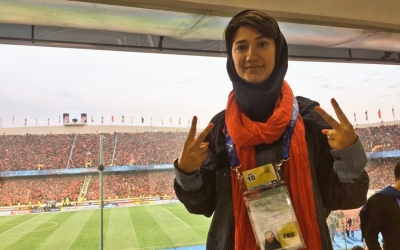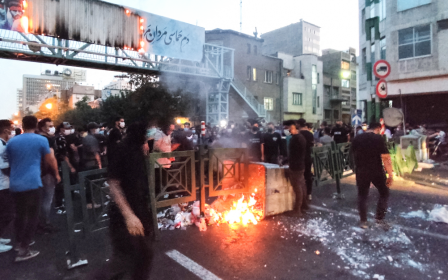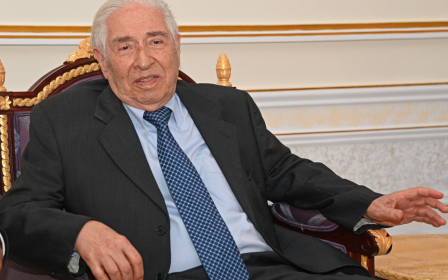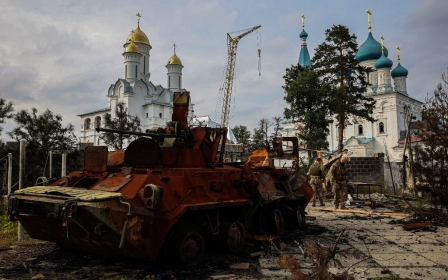Ukraine expels Iranian students following Iran drone sales to Russia
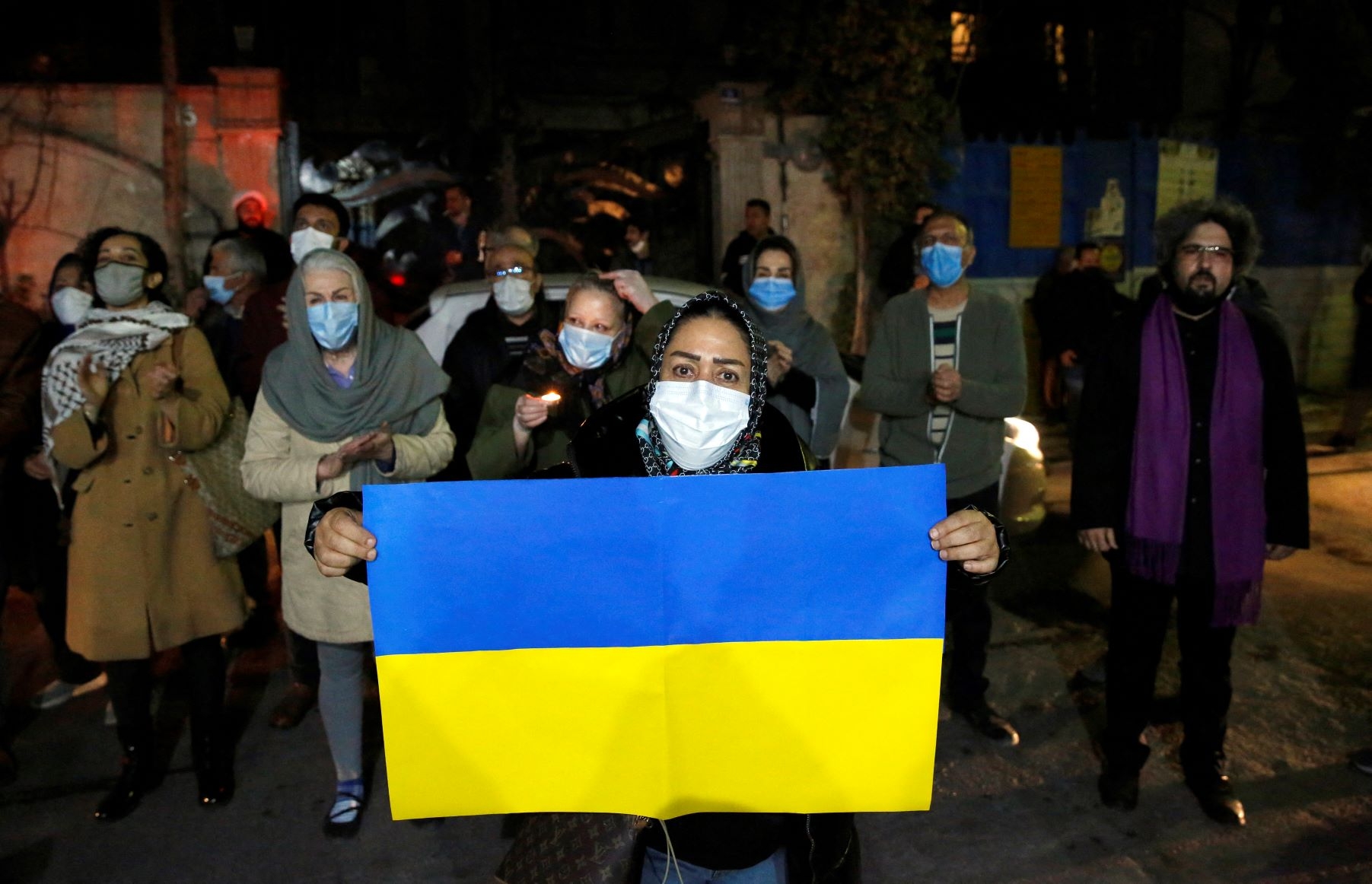
Ukraine has begun expelling Iranian students from the country in response to Tehran's alleged exports of drone technology to Russia, Middle East Eye has learned.
Iranian students told MEE that Ukrainian immigration officials had given this as the reason behind their refusal to extend the students' visas.
'The immigration officer looked right into my eyes and said you are being rejected because you are Iranian and your country has given drones to Russia'
- Ahmad*, Iranian medical student
"The immigration officer behaved very angrily with us and told us our visa wouldn't get extended because of 'the drones and the military officers your country sends to train Russians'," said Farid*, an Iranian student.
"'You should be responsible for your government's activity,'" he quoted the officer as telling the students.
Farid said the Iranian embassy apologised to the students and said there was nothing they could do.
New MEE newsletter: Jerusalem Dispatch
Sign up to get the latest insights and analysis on Israel-Palestine, alongside Turkey Unpacked and other MEE newsletters
"We were told by the Ukrainian immigration officials to leave the country within 10 days," he added.
A medical student, Ahmad*, who is now in Iran, told MEE he had also been ordered to leave the country within 10 days.
"They told me that 'your request has been rejected'," he said.
"The immigration officer looked right into my eyes and said 'you are being rejected because you are Iranian and your country has given drones to Russia'."
Ahmad also claimed that a number of students were taken to the national security department and interrogated.
Although another expelled student confirmed this, he said those who were taken weren't willing to talk about how they had been treated.
"I and a number of other Iranian students even asked the university to attend the classes online from my country," said Farid.
"But after a few days, they said 'this is not possible, as the immigration department and Ministry of Foreign Affairs have told us that you must be expelled'."
Drone diplomacy
Since the outbreak of the Russian war against Ukraine, Tehran has sided with Kremlin quietly while speaking to both sides, urging for peace through dialogue.
In late August, Iranian Foreign Minister Hossein Amirabdollahian visited Russia with the aim of mediating between Moscow and Kyiv.
Simultaneously, Mohammad Jamshidi, the political deputy of the Iranian president's office, tweeted that "one of the leaders of Western Europe had asked President [Ebrahim Raisi] to help mediate [between Europe and Moscow]. After a series of consultations, a peace initiative was sent to Moscow along with an important message by Foreign Minister Abdollahian."
However, no results were forthcoming.
Meanwhile, a number of outlets reported that Iran had sold suicide drones to Russia.
On 17 September the Wall Street Journal quoted Ukrainian commanders saying that Russia managed to inflict significant damage on Ukrainian forces by using Iranian suicide drones.
Consequently, the Ukrainian government announced "the revocation of accreditation" of Iran's ambassador.
"In response to Iran supplying weapons to Russia to use in its war against Ukraine, today we announced the revocation of accreditation of the Iranian Ambassador in Kyiv, and a significant drawdown of diplomatic personnel at the Iranian embassy," tweeted Oleg Nikolenko, the spokesperson for the Ukrainian foreign ministry on 23 September.
A few days later, on 26 September, Viktor Kovalenko, a journalist, wrote on his Twitter account that the armed forces of Ukraine attacked a Russian base in the occupied city of Skadovsk in Kherson province, "killing 20 military instructors from Iran who were teaching 40 locals and 20 from Russia to operate Shahed-136 drones".
While Ukrainian officials strongly believe that Iran has sold suicide drones to Russia, Tehran has so far rejected the allegations.
'This is driving me crazy'
Shortly after the outbreak of the war in Ukraine, Iran's Ministry of Science declared that 1,424 Iranian students were studying in the country.
On 2 March, the Iranian government called for its citizens to leave the country.
For many students, however, they needed to prioritise finishing their studies - something which now appears impossible.
"It was the fifth year of my study at the National Ukrainian University, but they practically expelled me and others from their country for something that is not related to us at all," said Farid.
"They put a red stamp on a page of our passport. This resulted in the University also telling us that it cannot do anything except expel us."
Ali*, an Iranian student at Taras Shevchenko National University, also failed to have his visa extended and received a red stamp in his passport.
"By putting the red stamp inside our passport, they are officially telling us not to step on Ukrainian soil for the next three years," he told MEE.
He added that he had appealed for help from the university, but they said they were powerless.
"They just said 'it is not our decision to take, it has been taken by others'," he explained.
"I was just one year away from finishing my degree, and this is driving me crazy."
MEE asked the Ukrainian education ministry for comment but had received no response at time of publication.
MEE also asked all the universities referenced for comment but also received no response.
*Names have been changed for security reasons
This article is available in French on Middle East Eye French edition.
Middle East Eye delivers independent and unrivalled coverage and analysis of the Middle East, North Africa and beyond. To learn more about republishing this content and the associated fees, please fill out this form. More about MEE can be found here.


